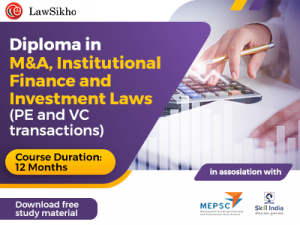This article has been written by Sidharth Trehan, pursuing the Diploma Programme in M&A, Institutional Finance, and Investment Laws (PE and VC transactions) from LawSikho.
Table of Contents
What is dematerialization?
- The term dematerialization means conversion/converting of the physical shares and debentures certificate to an electronic form. These conversions help people or investors to maintain shares and securities in a much easier and time-saving manner.
- The dematerialization of shares reduces the chances of theft, forgery, and fraud which were much easier and uncontrollable earlier.
- After dematerializing the shares and securities, the electronic records are stored at depositories like National Securities Depository Limited (NSDL) and Central Depository Service Limited (CDSL).
Why is dematerialization needed?
The process of dematerialization is important as it’s hard to stay track of all the physical documents and paper-based certificates. Managing these crucial documents can be a task and chances of misplacing, theft and fraud are very much possible. It can become the explanation for the breakdown of the Indian Share Market and any businesses related to it. Not only that, if a share is being transferred 0.5% is saved for stamp tax. There has been a total shift in technology in relation to share market and trading, now people can trade from their phone and laptop with a good internet connection during the market hours from anywhere on the planet. The shares that are Dematerialized receive dividends and bounce directly into the account and therefore it’s more convenient to manage and be updated.
Benefits for dematerialization
- Effortless and convenient
A DEMAT Account provides the user or investor with a facility to carry out the transactions Electronically/Digitally. There is no need for the investor to be physically present at the broker’s place to settle a transaction. Therefore, the investor can have access to the DEMAT Account using a computer or a smartphone from any location. The investor can convert his physical shares into Electron/Digital format to become a legal owner of them, which will give him a right to sell or trade whenever required.
- Allocation and fund transfer
By linking with the DEMAT Account, the transfer of funds becomes very easy from the bank account and there is no extra cost charged. This saves the investor from the trouble of drawing a cheque or transferring the funds manually into the DEMAT Account.
- Protected and secure
The DEMAT Account which is holding all the digital shares is the most safest and secure way to carry out trade-related transactions. All the risks like theft, damage, forgery, and misplacing of share certificates that were connected with holding physical shares are completely eradicated.
- Nominee facility
The DEMAT Account provides the investor with a facility to grant another person who is nominated by the investor, with a right to operate on his DEMAT Account under his absence. This is basically when the person/investor is not present physically or has been deceased so the nominee can take control over the shares.
- Paperless transactions
The main benefit of using a DEMAT Account is that it eliminates the need for paper. Since the DEMAT Account is about holding shares or securities in electronic/digital form, the use for the paper is almost zero. In addition, the Account has also proved to be very useful for the companies in reducing their administrative costs and struggles.
- Easily traceable
With the help of a DEMAT Account, an investor can monitor his portfolio from anywhere across the globe. The ease of being able to monitor the portfolio performance and to make the decision spontaneously to sell or buy the stock as per the actual condition of the market enhances the chances of making more profits because of the increase in participation.
- Helps in Receiving corporate benefits
DEMAT Account comforts the process of receiving various benefits like dividends, interest, and refunds. All the profit amount gets directly added into the DEMAT Account. Other advantages like stock splits, bonus shares, and rights shares. Get directly added to the Account.
- One account multiple purposes
In the DEMAT Account, the investor can not only hold shares or equities but also hold debt instruments, currencies, and commodities like gold, etc. You can even sell, purchase mutual funds units through the DEMAT Account. It’s one account but has many purposes.
What’s the process of dematerialization?
Dematerialization Request Form (DRF) is necessary for the conversion of physical shares and debenture certificates into an electronic or digital form.
- It is a comprehensive process, firstly you need a Depository Participant (DP) that offers DEMAT Services. As DEMAT Account plays a crucial role here.
- The Dematerialisation Request Form (DRF) needs to be filled and submitted with the share or debenture certificates. One thing to be noted here is that each certificate shall be mentioned with “Surrendered For Dematerialisation”.
- After this, the Depository Participant (DP) shall pass the request of Dematerialisation to the Depository, Registrar, and Transfer Agent along with the Share and Debenture certificates.
- The process status shall be informed by the registrar to the Depository and upon confirmation, the investor’s account will show the credit shares.
- The DEMAT Account number and respected ID generated helps the user to access the online DEMAT Account.
- This process of Dematerialisation can take between 15 to 20 days.
What is rematerialization?
- The term rematerialization is the opposite of Dematerialization, in this, the investor or person who has already converted the securities and debenture certificate to electronic or digital form has an option of converting them into physical or paper form. Therefore under this, the electronic/digital existence is revoked and physical existence is commenced.
- The investor or the client has to submit a request known as Re-mat Request Form (RRF) for Rematerialisation to the Depository Participant (DP), after this process the holdings are converted from electronic to physical certificates.
- Therefore, the Rematerialisation process is very complex & may take up to 30 days to complete.
What’s the procedure for the rematerialization of shares and securities?
- The investor or the person needs to submit the REMAT Request Form (RRF) to the Depository Participant (DP).
- The Depository Participant (DP) approaches the depository with the form, then it forwards the request to the Registrar.
- The forms are then handed to the Registrar for verifications.
- Then the Registrar prints new physical certificates and forwards them to the investor who wants to Rematerialise its share or securities.
- Once the Registrar confirms the REMAT request to the Depository Participant (DP), the investor or the person receives the new certificates in the account.
- The process of Rematerialisation takes between 20 to 30 days.
Relevant legal provisions for rematerialization
- Bye-laws 9.4 NSDL: Rematerialization, this talks about the legal methods of transferring securities.
- Business Rule 11.2 NSDL: Rematerialization of securities, talks about transferring of these securities to others and other important legal guidelines.
 Comparison between dematerialization and rematerialization
Comparison between dematerialization and rematerialization
|
Comparison Constraints |
Dematerialization |
Re-materialization |
|
Meaning |
The transformation of physical certificates of shares and debentures to electronic/digital form. |
Transforming the electronic records of the shares to physical certificate form. |
|
Identification Of Shares |
Dematerialized shares do not have distinct no’s. |
They have distinct no. issued by the RTA. |
|
Transaction Mode |
All transactions take place in electronic formats only. |
All transactions post-rematerialization take place physically. |
|
Account Maintenance Authority |
The DP (NSDL or CDSL) is in charge of account maintenance. |
The company is in charge of account maintenance. |
|
Maintenance Costs |
The charges for maintenance vary between Rs. 200 to Rs. 999. |
Maintenance charges are not necessary for physical share certificates. |
|
Security |
Threats to electronic form are low. |
The threat of forgery, theft, and fraud to physical shares is higher. |
|
Difficulty |
Dematerialization is an easy process. It is a universal part of share trading; almost every investor has experienced this once. |
Re-materialization is an exhaustive process that takes a long duration to execute. It may require an expert’s support. |
Conclusion
Both the terms dematerialization and rematerialization are basically opposite of each other but they have their own significance in the world, it’s as per the people’s convenience what they want. As per the government, dematerialization is an important process and was made mandatory for the public & the investors. Therefore, still, if people wish to opt for rematerialization of shares they can take the help of DP or Broker and other expert assistance as it’s a complex task.
Students of Lawsikho courses regularly produce writing assignments and work on practical exercises as a part of their coursework and develop themselves in real-life practical skills.
LawSikho has created a telegram group for exchanging legal knowledge, referrals, and various opportunities. You can click on this link and join:
 Serato DJ Crack 2025Serato DJ PRO Crack
Serato DJ Crack 2025Serato DJ PRO Crack










 Allow notifications
Allow notifications


